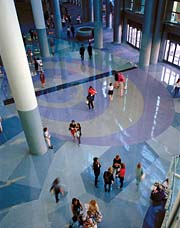In recent years, ASHRAE's technical program has focused on emerging trends and new technology. Ron Shelton, chair of the ASHRAE Program Committee, which selects the program, noted, "While those sessions have been helpful, we have heard from attendees that they want practical, useful information that they can use on a daily basis. This year's program will provide that guidance." That's good news for contractors, who are usually more interested in the practical side of the business.

Some Of The Highlights
The technical program is comprised of 63 seminars (presentations on a central or related topic with no published papers), 11 symposia (presentations with papers on a central subject), 24 open-discussion forums, one technical session (paper presentations), a poster session, and a public session. A total of 66 papers will be presented.A number of the sessions should be of interest to contractors. These include:

Public Session
As noted earlier, ASHRAE will once again be offering a free public session during the AHR Expo. This year's session is titled "Improving Residential HVAC Energy Efficiency," and it will take place from 3:00 to 5:00 p.m. on Monday, Jan. 26, at the Anaheim Convention Center. Admission is free, and registration is not required. The public session is sponsored by ASHRAE's technical committee on residential and small building applications.The session will focus on major areas of achieving energy efficiency in residential construction for both new and existing housing. Energy, implementation costs, cost savings, and health benefits related to energy savings measures will be discussed. Examples of measures that will be discussed include replacement of air conditioners, which normally last 10 to 15 years.
Speakers will discuss how homeowners, business owners, and contractors can reduce energy costs from 10 to 30 percent. Savings can be obtained by sealing cracks, windows, and doors; repairing and sealing ductwork; and through other measures that can be effectively implemented.
Speakers and topics include:
Technical Tours
ASHRAE is also offering a wide variety of technical tours.A tour of the CSULB central plant will be held Sunday, Jan. 25, from 2:30 to 5:00 p.m. A variety of engineering challenges were faced in development of this central plant. Design requirements specified that it not be recognized as a central plant and not generate ambient noise. Because of restricted space requirements, ice storage was accomplished by building a three-story room in the hillside filled with ice cubes at night. The cost is $20 per person.
Another option is to tour the Anaheim Convention Center on Sunday, Jan. 25, from 3:30 to 4:30 p.m., or Monday, Jan. 26, from 3:30 to 4:30 p.m. Visitors can take a walking tour of the 1.7-million-square-foot facility. With the recent expansion of the central plant, the roof was outfitted with an array of photovoltaic panels. The center includes five mechanical plants with 13 chillers supplying 9,000 tons of cooling and 40 air handlers providing 24,000 cfm. The photovoltaic array, in the form of solar tiles, covers 12,500 square feet of roof area and has an output of 102 kW. The cost is $5 per person.
Ralph's Ice Cream Plant can be toured Monday, Jan. 26, from 2:40 to 4:40 p.m. This plant produces 6 million pounds of ice cream a year. Ralph's uses an ammonia system for refrigeration. The cost is $20 per person.
The National Fuel Cell Research Center (University of California, Irvine) can be toured Tuesday, Jan. 27, from 1:30 to 4:30 p.m. This tour provides a look at the cutting edge of electrical power generation technology including microturbine generators, more efficient burners for boilers and turbines under development, fuel cell research, combined fuel cell/turbine generator concept. The cost is $20 per person.
A final option is to visit Ford Motor Headquarters on Tuesday, Jan. 27, from 1:30 to 4:30 p.m. The building is the first in Orange County and the third in California to secure LEED certification. Features include a natural gas fuel cell, a raised-floor air-distribution system, and a green roof on the product development wing. The cost is $20 per person.
For more information or to register, visit www.ashrae.org. For a complete listing of technical program sessions, go to www.ashrae.org/template/PDFDetail/assetid/27694.
Publication date: 01/12/2004


Report Abusive Comment